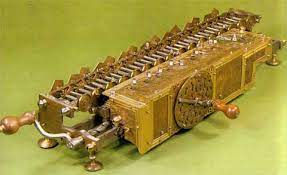
Long before the advent of modern computers, even before electricity was harnessed to power the kind of circuitry that makes large-scale computational processing possible, Leibniz conceived of a computational machine. He got the germ of this idea from the 14th Century Majorcan mystic and logician, Raymond Llull. Leibniz had great hopes for mechanizing and automating computational processes, promising at one point that disputes of all sorts might be settled by calculation. To this end, he commissioned a prototypical calculating engine made of brass. The device failed to work when he attempted to demonstrate its efficacy for the Royal Society, but his enthusiasm for the project never diminished. Jonathan Gray summarizes Leibniz’s pioneer work.
